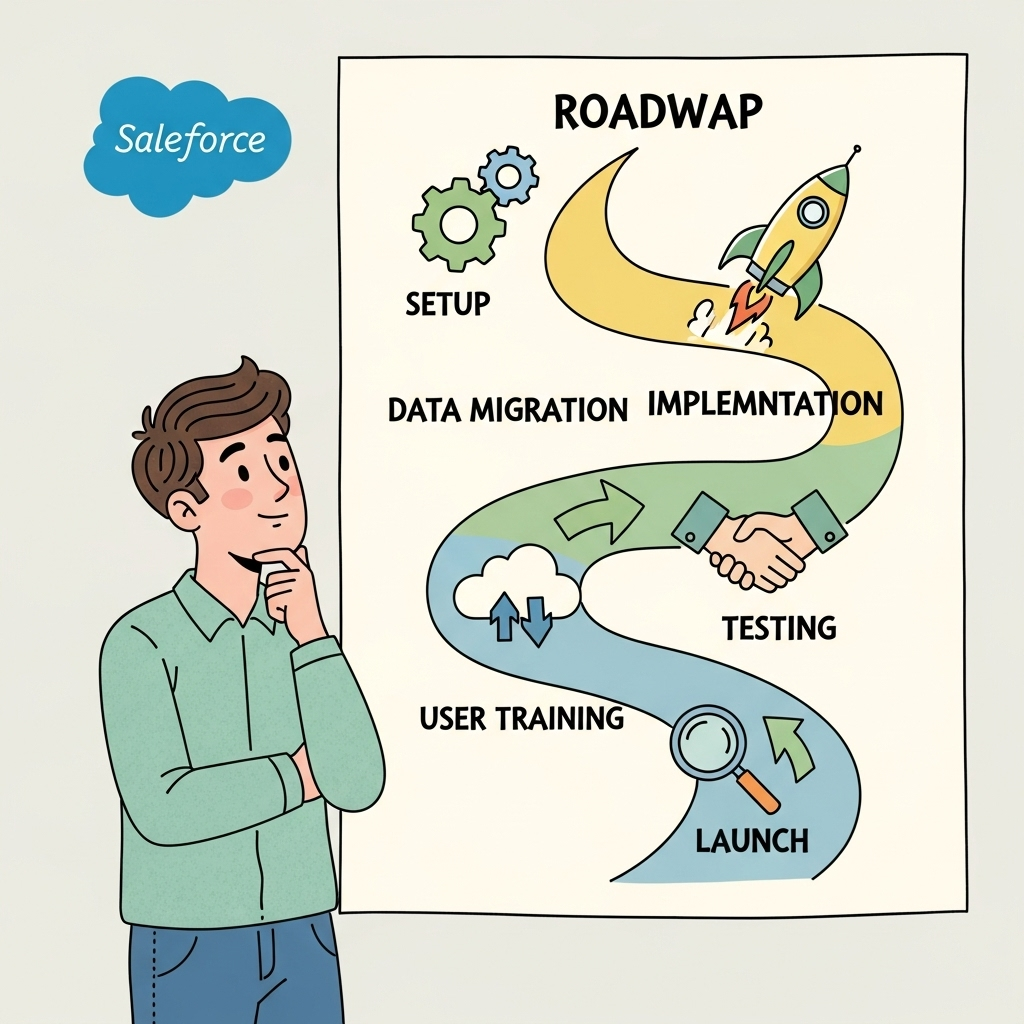Thinking about a salesforce implementation but feeling uncertain about where to begin? Let’s explore what Salesforce can do, why it matters for businesses like yours, and how a thoughtful approach makes all the difference.
What is Salesforce and Why Does It Matter?
Salesforce is a leading cloud-based platform that helps businesses manage their customer relationships, sales, support, and marketing—all in one place. But it’s much more than a customer database. With Salesforce, organizations of every size can streamline day-to-day processes, improve communication among teams, and ultimately delight their customers.

By centralizing important information, Salesforce empowers you to make informed decisions quickly, which is why it’s become a trusted solution for companies worldwide. Learn more about the Salesforce platform.
Understanding Salesforce Implementation: A Beginner’s Guide
A salesforce implementation means introducing and customizing the platform for your business’s unique needs. It’s not just about installing software—it’s about aligning Salesforce with your goals, processes, and the way your team works.

This journey could involve everything from setting up basic contact management to integrating more advanced tools and automation. A well-planned implementation enables your business to get the most out of Salesforce, supporting growth and efficiency from day one.
Common Challenges in Salesforce Implementation
Sometimes, teams feel overwhelmed by the possibilities—or limitations—of new technology. For example, not everyone may know exactly what features they need, or how to get staff excited about adopting something new. Resistance to change is common, and miscommunication between departments can slow progress. Data migration, if not handled carefully, can also result in lost or duplicated information.

However, these hurdles are entirely normal. With a clear plan and the right support, these challenges can be addressed before they become setbacks.
The Role of a Salesforce Consultant in Your Journey
Enlisting a Salesforce consultant can make all the difference. This expert doesn’t just set up your account—they get to know your business, recommend the best features, and often train your team. Consultants are skilled at translating your business needs into technology solutions that truly fit. Not every organization has the resources to figure everything out alone, so working with a consultant can save time, reduce costs, and increase your success rate.

Reliable consultants, such as those at Blanmo, will walk alongside you every step of the way, ensuring Salesforce is tailored to your goals.
Key Steps to a Successful Salesforce Implementation
So, how does the salesforce implementation process typically unfold? Here are a few important steps to keep in mind:
- Set Clear Objectives: Understand exactly what you want to achieve, such as better lead tracking or improved customer service.
- Choose the Right Team: Involve both internal stakeholders and a trusted Salesforce consultant for broad expertise.
- Customize the Platform: Tailor Salesforce to match your workflows, language, and processes instead of using a one-size-fits-all setup.
- Data Migration: Safely move your current data into Salesforce, eliminating duplicates and ensuring accuracy.
- Training and Support: Teach your team how to use Salesforce effectively, so everyone feels confident.
- Testing: Before going live, check everything thoroughly to identify bugs or gaps.
- Go Live and Monitor: Launch Salesforce, but keep an eye on how things are working—and make adjustments as needed.
These steps help ensure a smooth transition and set you up for long-term success. For a detailed breakdown of the process, Salesforce themselves offer helpful checklists and resources.
How to Choose the Right Salesforce Consultant for Your Needs
Picking the right partner is crucial. Look for consultants who have a proven track record with businesses similar to yours, and who take the time to explain things in simple language. Consider their certifications, case studies, and whether their approach aligns with your company culture. Take time to interview potential partners to gauge their interest in your objectives. Trustworthy consultants like Blanmo will focus on what brings value to your business, not just the technology itself.
Tips for Ensuring Lasting Success After Implementation
Implementation isn’t a one-time event—it’s the start of an ongoing journey. Encourage feedback, ask employees for suggestions, and schedule regular “health checks” for your Salesforce setup. Stay curious: as your business evolves, so can Salesforce’s features. There is also a vast Salesforce user community you can join for support and new ideas.

Adopting a culture of learning ensures your investment continues to benefit your business for years to come. For best practices and tips, check out G2’s Salesforce implementation insights.
Frequently Asked Questions About Getting Started with Salesforce
How long does a salesforce implementation take?
It depends on the size of your company and how much customization you need. Simple projects may take a few weeks; more complex ones could need several months.
Do I need technical experience to manage Salesforce?
No—it’s designed for users of all levels. A qualified salesforce consultant can set up everything and provide training tailored to any background.
Will my team really use Salesforce?
With the right approach and training, most teams quickly see the benefits and embrace the new platform.
Every business’s journey is unique, but salesforce implementation doesn’t need to be daunting. With preparation, the right support, and a dedication to ongoing improvement, you can confidently move forward—making every customer interaction smarter, faster, and more meaningful. If you’re curious about how Salesforce could fit your organization, consult with trusted experts like Blanmo who understand your goals and will guide you every step of the way.
